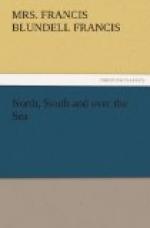“He’ll be comin’ to take me out of it,” returned the mother. “He doesn’t raly know I’m in it at all. I’ll tell ye now the way it is. When the poor father died—the light o’ heaven to him—an’ bad times come, and we had to give up our own beautiful little place, Barney brought me to town an’ put me with Mrs. Byrne, a very nice respectable woman that was married to a second cousin o’ my poor husband’s, an’ I was to stop with her till he came back from America with his fortune made. Well,” pursued Mrs. Brady, drawing in her breath with a sucking sound, which denoted that she had come to an interesting part of her narrative, “well, he kep’ sendin’ me money, ye know, a pound or maybe thirty shillin’ at a time—whenever he could, the poor boy, an’ I was able to work the sewin’-machine a little, an’ so we made out between us till I took this terrible bad turn. Well, of course troubles niver comes single, an’ the last letther I got from my poor little fella had only fifteen shillin’ in it, an’ he towld me he had the bad luck altogether, but, says he,’My dear mother, ye must on’y howld out the best way ye can. There’s no work to be got in this place at all’ (New York I think it was). ‘But I am goin’ out West,’ says he, ’to a place where I’m towld there’s fortunes made in no time, so I’ll be over wid ye soon,’ he says, ‘wid a power o’ money, an’ I’m sure Mary Byrne’ll be a good friend to ye till then. The worst of it is,’ he says, ’it’s a terrible wild outlandish place, and I can’t be promisin’ ye many letthers, for God knows if there’ll be a post-office in it at all,’ says he; ‘but I’ll be thinkin’ of ye often, an’ ye must keep up your heart,’ he says. Well,” sucking up her breath again, “poor Mrs. Byrne done all she could for me, but of course when it got to be weeks an’ months that I was on my back not able to do a hand’s turn for meself, an’ no money comin’ an’ no sign o’ Barney, what could she do, the crature? One day Dr. Isaacs says to her, ‘Mrs. Byrne,’ says he, ’why don’t ye send poor Mrs. Brady to the Infirmary?’ ’What Infirmary, sir?’ says she. ‘The Union Infirmary,’ says he; ’it’s the on’y place she’s fit for except the Incurables in Dublin,’ says he, ‘an’ I’m afraid there’s no chance for there.’ ‘Oh, docther, don’t mention it!’ says poor Mrs. Byrne—she was telling me about it aftherwards. ’Is it the Union? I wouldn’t name it,’ she says, ’to a decent respectable woman like Mrs. Brady. She’s a cousin by marriage o’ me own,’ she says; ‘I wouldn’t name it to her, I assure ye.’ ’Just as you please,’ says Docther Isaacs. ’It ’ud be the truest kindness you could do her all the same, for she’d get betther care and nourishment than you could give her.’ Well, poor Mrs. Byrne kep’ turnin’ it over in her mind, but she raly couldn’t bring herself to mention it, nor wouldn’t, on’y she was druv to it at the end, the crature, with me bein’ ill so long, an’ the rent comin’ so heavy on her an’ all. So we settled it between the two of us wan day, an’ she passed me her




